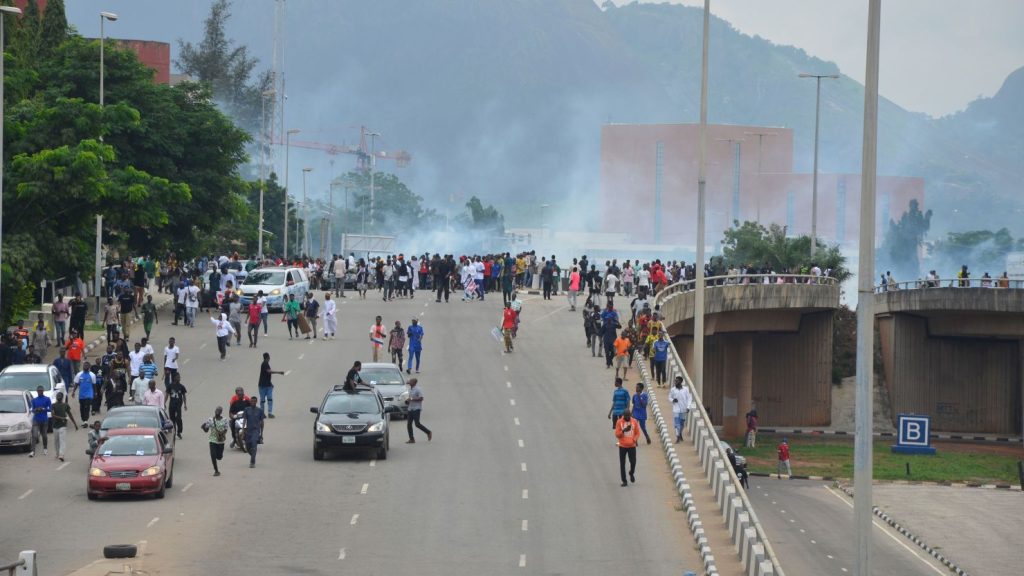29 children may be sentenced to death for protesting against cost-of-living crisis in Nigeria
3 min read
Police fire tear gas during a protest against Nigeria's cost-of-living crisis in Abuja on Aug. 1, 2024. Olamikan Gbemiga/AP/File

Police fire tear gas during a protest against Nigeria's cost-of-living crisis in Abuja on Aug. 1, 2024. Olamikan Gbemiga/AP/File
In a shocking development, Nigeria is witnessing a significant backlash over the prosecution of 29 minors, aged between 14 and 17, who could face the death penalty for their alleged involvement in protests against the escalating cost of living. These children are part of a larger group of 76 individuals charged in court recently, igniting national and international concern.
The charges brought against the minors are severe, including treason, destruction of property, public disturbance, and inciting a military coup. These allegations have raised alarm bells among human rights advocates, who argue that the legal actions against these children are disproportionate and punitive.
During the court proceedings, four of the children collapsed from exhaustion before they could even enter a plea, highlighting the dire conditions they have reportedly endured while in police custody since August. The protests that led to their arrest erupted in various cities across Nigeria in response to economic reforms that included the removal of fuel subsidies and the devaluation of the naira. These changes have triggered rampant inflation and have severely impacted the livelihoods of ordinary Nigerians.
President Bola Tinubu’s administration has defended these economic policies, arguing that they are essential for the country’s financial stability. However, the drastic measures have exacerbated the struggles of many citizens, prompting widespread demonstrations. Security forces have faced accusations of using excessive force during these protests, with human rights organization Amnesty International reporting that at least 13 people lost their lives in clashes with law enforcement.
The legal representation for the minors has stated that they were granted bail, although the case is set to return to court in January for further proceedings. The gravity of the situation is underscored by Nigeria’s historical context regarding the death penalty. Introduced in the 1970s, the death penalty has not been enforced since 2016, leading many to question the motives behind these charges and the potential implications for human rights in the country.
The international community has reacted with outrage, calling for the protection of children’s rights and an immediate review of the charges against these minors. Advocates argue that using the threat of the death penalty against children for participating in protests not only violates fundamental human rights but also sets a dangerous precedent for governance and civil liberties in Nigeria.
The protests that began in August were not isolated incidents; they were a reflection of deep-rooted frustrations among Nigerians struggling with economic hardship. Many citizens took to the streets to express their dissatisfaction with the government’s handling of the economy, which has seen the cost of living soar while wages have stagnated. The economic policies implemented by President Tinubu’s administration, particularly the removal of fuel subsidies, have led to significant increases in transportation and food costs, further fueling public discontent.
As the situation continues to unfold, the eyes of the world remain on Nigeria. Activists and human rights organizations are mobilizing efforts to support the children and demand accountability from the government. There is a growing call for a reassessment of Nigeria’s approach to dissent and public assembly, emphasizing the need for dialogue rather than repression.
In summary, the potential death sentences for these minors have sparked widespread outrage and concern both within Nigeria and internationally. The situation underscores the urgent need for a reassessment of how dissent is handled in the country and highlights the critical importance of protecting the rights of all individuals, particularly the most vulnerable. As the case moves forward, it will be essential for the Nigerian government to consider the implications of its actions on the rule of law and human rights in the nation.